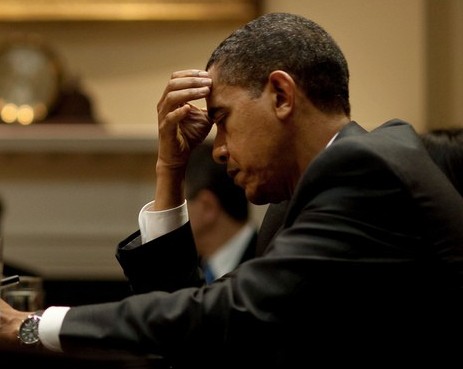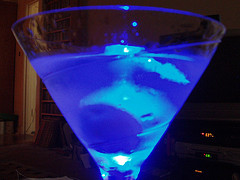As negotiations reached a rapid boil at the Bella Center last night, and expectations for a positive outcome at COP15 simultaneously soared and sank, some U.S. leaders took a brief reprieve in the neighborhood of Rydhave — a wealthy enclave of Copenhagen about 25 minutes outside of the city center. Gathered at the personal residence of U.S. Ambassador Laurie Fulton were the members of the congressional delegation led by Speaker Nancy Pelosi (including climate advocates like Henry Waxman and Edward Markey, and foes such as Marsha Blackburn. Also present was surprise guest climate megastar — Al Gore.
Here, amid warm family introductions, quips, canapes, and frosty cocktails, the mood was light. But back at the Bella Center, things were fraught. Climate negotiators had been buoyed early in the day by Hillary Clinton’s promise of $100 billion by 2020 to help developing nations cope with the impacts of climate change — a game-changer that reportedly caused Chinese negotiators to ease ever so slightly off their resistance to negotiating terms of transparency.
 But that positive development was offset by a leaked UN report showing that current emissions pledges at the conference still added up to a 3-degree Celsius rise, 50 percent higher than the stated 2C goal. The Guardian, which first exposed the leak, reported: “A rise of 3C would mean up to 170 million more people suffering severe coastal floods and 550 million more at risk of hunger, according to the Stern economic review of climate change for the UK government – as well as leaving up to 50% of species facing extinction.”
But that positive development was offset by a leaked UN report showing that current emissions pledges at the conference still added up to a 3-degree Celsius rise, 50 percent higher than the stated 2C goal. The Guardian, which first exposed the leak, reported: “A rise of 3C would mean up to 170 million more people suffering severe coastal floods and 550 million more at risk of hunger, according to the Stern economic review of climate change for the UK government – as well as leaving up to 50% of species facing extinction.”
Swallowing a sip of wine, I wander over to Congressman Markey without my recorder (not a recorder-friendly type of affair). Markey is a bright light bulb of a guy. I ask him the question of the moment: “Is a weak deal better than no deal?” He smiles, shaking his head and says (I paraphrase from memory) …
Markey: We aren’t going to get a weak deal. We’re going to get a strong deal. End of story.
Q. Let’s just say hypothetically–that we had to choose between a weak deal and no deal?
Markey turns to greet a colleague.
Q. Just considering all possible outcomes — would a weak deal be better than no deal?
Markey: I won’t talk hypothetically. It’s fatalist. It’s defeatist — this agreement is going to be strong.
Spurned, I drift over to Gore and pose the same question. Gore was friendly, engaged, and offered his insights for the better part of 10 minutes. A few highlights of the chat — again paraphrased from memory:
Gore: Well, we know the deal is going to be weak. So whether’s worse than no deal at all depends on how weak it is.
Q. What’s too weak?
Gore: If it’s just pledges and reporting it’s too weak. There has to be transparency, there has to be verification. There has to be the foundation of a good financing plan. It needs to include a commitment to meet again soon — June or July — to commit to something that’s legally binding.
Q. How do you define transparency? Is it the same thing as MRVs (short for “Measurable, Reportable, Verifiable”)?
Gore: Yes, transparency is my language for MRVs. And China, as you know, doesn’t want it.
Q. Do you think if transparency were defined in an unthreatening way — as non-invasive, something that doesn’t pose a threat to China’s sovereignty — that China would be more amenable?
Gore: Perhaps.
Q. How are you feeling about all this? You’ve been through a lot of these negotiations — are things where they’re supposed to be right now?
Slight wince.
Gore: It’s different this time. Things aren’t as far along — largely because we don’t have the moral urgency of talks in the past that were legally binding. Since this is about setting a framework, it just hasn’t been demanding the same level of urgency. It’s anybody’s guess what will happen — we’re on the bubble right now.
Spread the news on what the føck is going on in Copenhagen with friends via email, Facebook, Twitter, or smoke signals.





